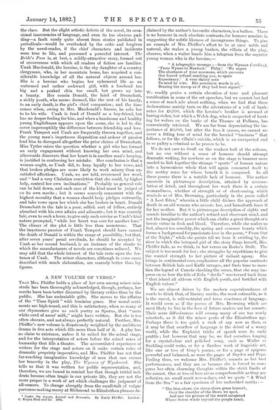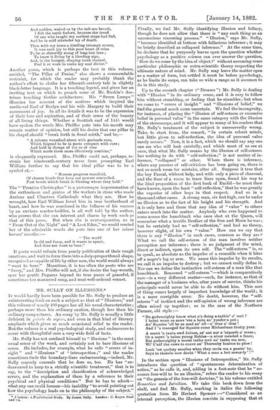A NEW VOLUME OF VERSE.*
THAT Mrs. Pfeiffer holds a place of her own among minor min- strels has been thoroughly acknowledged, though, perhaps, her merits have been better discerned by literary critics than by the public. She has undeniable gifts. She moves to the afflatus of the "Time Spirit" with feminine grace. Her moral senti- ments are high-toned, and this is satisfactory, when so many of our rhymesters give us such poetry as Spores, that "mere white curd of asses' milk," might have written. But she is too often obscure, and not always perfectly natural. Further, Mrs. Pfeiffer's new volume is disastrously weighted by the ambitious drama in five acts which fills more than half of it. A play has no claim to existence, unless it be suited for the actual stage, and for the interpretation of actors before the mixed mass of humanity that fills a theatre. The accumulated experience of writers for the stage and actors on it make certain rules of dramatic propriety imperative, and Mrs. Pfeiffer has not that far-reaching imaginative knowledge of men that can excuse her temerity in the play, The ltrymtett of 1Tryithavoct. She tells us that it was written for public representation, and, therefore, we are bound to remind her that though trivial inci- dents become often tragic in our private life, they are not the more proper in a work of art which challenges the judgment of all-comers. To change abruptly from the small-talk of vulgar parvenus making merry at Richmond to Elizabethan phrases de- Under the kmens, Lyrical and Dramatic. By Emily Pfeiffer. London: C. Kagan Paul and Co. DM.
claimed by the author's favourite characters, is a bathos. There is no humour in such absolute contrasts, for humour consists in suggesting the subtle likeness of incongruous things. To give an example of Mrs. Pfeiffer's effort to be at once noble and natural, she makes a young banker, the villain of the play, observe, when a waiter hands him a telegram from the superior young woman who is the heroine,-
" A telegraphic message ;—from the Wynnos (reading),
'From Wynne to Murdock.' Pithy ! We regret
The shortness of your summons, which prevents
Our forced refusal reaching you, to spare Expectancy.' A very dainty note
To send by wire. But seventeen words in all,
Bearing her stamp as if they had been signed."
We readily praise a certain elevation of tone and pleasant versification in some of the set speeches, but we cannot but feel a sense of much ado about nothing, when we find that these declamations mainly turn on the adventures of a roll of bank- notes for £6,000, which the heroine's brother is accused of having stolen, but which a Welsh dog, who is suspected of hunt- iug for wolves on the banks of the Thames at Fulham, has conveniently retrieved. We are far from depreciating the im- portance of £6,000, but after the fuss it causes, we cannot re- cover a fitting tone of mind for the hurried " business " that follows, or for the villain's suicide, which is an unexpected end to so paltry a criminal as he proves to be.
We do not care to dwell on the weakest half of the volume, but no one without a sense of humour should attempt dramatic writing, for nowhere as on the stage is humour more needed to link together the strange " sports " of human nature into a harmonious whole that will again commend itself to the motley mass for whose benefit it is composed. In all these poems there is a notable lack of humour. The author succeeds in picturesque description, attained by accumu- lation of detail, and throughout her work there is a certain womanliness, whether of strength or of shortcoming, which reminds us of Mrs. Browning, particularly in the poem called " A Lost Eden," wherein a little child divines the approach of death in an old woman who accosts her, and henceforth fears it for her mother. But it is picturesque description of sights and sounds familiar to the author's refined and observant mind, and not the imaginative power which can clothe a great thought or a heroic virtue in flesh and blood. Therefore, while she makes us feel, almost too sensibly, the spring and summer beauty which forms a background for passionate love in the poem, " From Out of the Night ;" while she paints till we hear it swirling by, the river iu which the betrayed girl of the story flings herself, Mrs.
Pfeiffer fails, as we think, in her verses on Rorke's Drift. The subject is too much for her ; she struggles by repetitions to give the wanted strength to her picture of valiant agony. She brings in sentimental cues, emphasises all the popular contrasts between British lads and Kaffir savages, and finds time to men- tion the legend of Canute checking the ocean, that she may im- press on us how the tide of Zulu " devils " was turned back from " that island all abloom with English youth, and fortified with English valour."
We are almost driven by the modern superabundance of words to think that, of literary merits, the most estimable, as it is the rarest, is self-restraint and terse exactness of language. It would seem as if the poems of Mrs. Browning which are most likely to live in the love of future readers are her sonnets.
Their mere diffusiveness will swamp many of our too wordy minstrels, as it did the minor poets of the Elizabethan age. Perhaps there is too quick a rush of sap now as then, or it may be that overflow of language is the drivel of a weary world, while the Euphuist tricks of speech were its early prattle ; but however that may be, we find ourselves longing for a crystal-clear and polished song, such as Waller or Suckling could write, or for a flawless work of linguistic art, like one or two of Gray's poems, or for a page of epigram powerful and balanced, as were the pages of Dryden and Pope. Feeling thus, we welcome Mrs. Pfeiffer's sonnets as her best
performances, and they are so because she is forced to com- press her often charming thoughts within the strict limits of the sonnet. One or two of hers are as comprehensible as they are
reflective, no small merit now-a-days, and we quote " A Wind from the Sea " as a fair specimen of her undoubted merits : -
" The blue above, the sheep-shorn grass beneath, Over the shoulder of the Down we sped,
And saw the picture of the world outspread Where Solent winds beyond the purple heath. And sudden, waked as by the salt-sea breath, I felt the earth forlorn, because the tread Of one who taught my earliest steps had fled, And he in cold attainder lay of death.
Then with my tears a kindling triumph strove, It was each joy to this poor heart of mine To be so shrewdly stung of long-lost love ;
To know it living by a bleeding sign, And, in the hungry, shaping tooth thereof,
Feel it at work to make my soul divine."
Another poem, which is perhaps the best in this volume,
entitled, " The Pillar of Praise," also shows a commendable restraint, for which the reader may probably thank the author's effort to clothe her fifteenth-century tale in slightly black-letter language. It is a touching legend, and gives her an inviting text on which to preach some of Mr. Ruskin's doc- trines touching Gothic architecture. His "Seven Lamps" illumine her account of the motives which inspired the medimval Earl of Roslyn and his wife Margery to build their monument of joy. In all its details it was to be the expression of their love and aspiration, and of their sense of the beauty of all living things. Whether a Scottish earl of 1445 would have spoken the words Mrs. Pfeiffer puts into his mouth may remain matter of opinion, but still his desire that one pillar in his chapel should "break forth in floral mirth," and be,-
" A column wreathed about with garlands rare, Which feigned to be in parts compact with care; And held in thongs of ivy or of vine
Which made them more effectively combine,"
is eloquently expressed. Mrs. Pfeiffer could not, perhaps, re- strain her nineteenth-century muse from prompting Earl William further to say that his ideal pillar was to be a
symbol of,—
" Human progress manifold, Of chosen bonds that keep our powers controlled, Fast bonds which break in blessing where they hold."
The "'Prentice Christopher" is a picturesque impersonation of the enthusiasm and genius of the workers in stone who made Amiens and Chartres Cathedrals what they are. How he wrought, how Earl William loved him in true brotherhood of heart, and how he was murdered in the fullness of his success by an envious master-builder, is all well told by the author, who proves that she can interest and charm by work such as that of this poem. But when she is over-expansive, as in ." From Out of the Night" and "A Lost Eden," we would remind her of the admirable words she puts into one of her minor heroes' mouths :—
" The world Is old and fussy, and it wants to speak, And does not want to hear."
If poets would refrain from yearly publication of their rough creations, and wait to form them into a duly-proportioned shape, recognised as capable of life by other men, the world would always " want to hear." Meantime, it is too often the poets who are " fussy," and Mrs. Pfeiffer will not, if she desire the bay-wreath, spur her gentle Pegasus beyond its true paces of graceful, if sometimes too mannered song, and neat well-ordered sonnet.







































 Previous page
Previous page